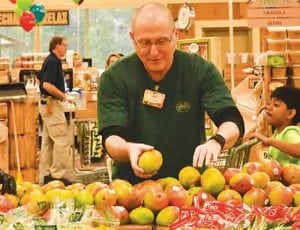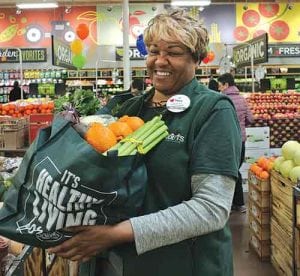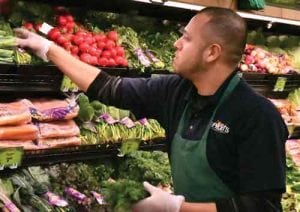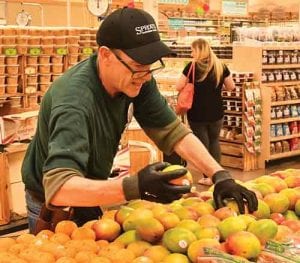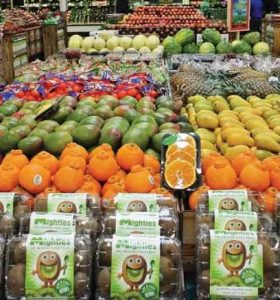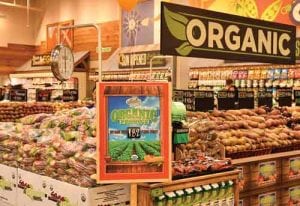10th Anniversary Annual Retail Sustainability Award
May 1, 2018 | 28 min to read
As Sprouts Farmers Market undergoes significant expansion in the Eastern U.S., its focus remains on its core mission of “Healthy Living for Less.” Produce is central to its identity, driving store sales while reinforcing the mantra “Good Food. Good People.” Through its sustainability initiatives, including a robust Food Rescue Program, Sprouts diverts food waste and runs community outreach efforts. By promoting employee training and engagement, Sprouts ensures accessibility and ethical sourcing while challenging the misconception that affordable, healthy food is unattainable.
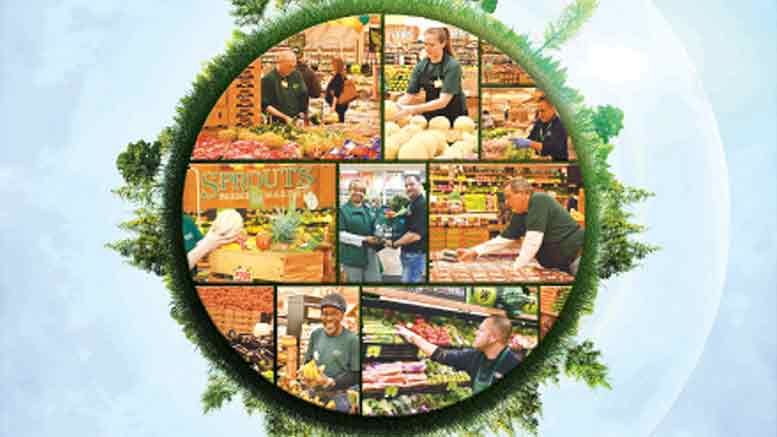
Originally printed in the May 2018 issue of Produce Business.
 As the food retail sector undergoes radical change and disruption to its structure and conduct, Sprouts Farmers Market, the 300-store, Phoenix-based chain revs up its major Eastern U.S. expansion with unwavering clarity. Retail chains (and produce suppliers) battle to differentiate, reinvent, remodel and rebrand themselves. Yet, Sprouts’ identity is set in stone, its underlying culture solidly intact, its philosophy and mission resolute, according to Dan Sanders, Sprouts chief operations officer. Coming from many years in conventional grocery, including as president of Acme Markets, Malvern, PA, Sanders contrasts how Sprouts diverges and what makes it unique. [See Q&A with Dan Sanders, next page]
As the food retail sector undergoes radical change and disruption to its structure and conduct, Sprouts Farmers Market, the 300-store, Phoenix-based chain revs up its major Eastern U.S. expansion with unwavering clarity. Retail chains (and produce suppliers) battle to differentiate, reinvent, remodel and rebrand themselves. Yet, Sprouts’ identity is set in stone, its underlying culture solidly intact, its philosophy and mission resolute, according to Dan Sanders, Sprouts chief operations officer. Coming from many years in conventional grocery, including as president of Acme Markets, Malvern, PA, Sanders contrasts how Sprouts diverges and what makes it unique. [See Q&A with Dan Sanders, next page]
The Sprouts business proposition to consumers is premised on a “Healthy Living for Less” formula, and its mantra communicated to the community is more holistic: “Good Food. Good People.” With produce at the heart of each store, the concept is built around four pillars of sustainability:
- Environment — fighting hunger through its Food Rescue Program, diverting food waste, and reducing carbon footprint are critical components;
- Sourcing — ethical and sustainable practices across the supply chain;
- Team — extraordinary collaborative training and leadership development;
- Community — charitable involvement through impactful partnerships.
Everything emanates from there, explains Carlos Rojas, vice president – legal, risk and sustainability. [See Q&A with Rojas, the man at the helm of Sprouts sustainability initiatives, next page]
Flipping the conventional grocery model to generate a transformational phenomenon, the center of each Sprouts store is the produce department. A collective energy of vibrant, well-laid-out displays and friendly, active associates radiates outward from the produce center and pulls shoppers toward it. From the moment they walk through any of the stores’ entrances, shoppers see the movement of produce staff members unloading boxes of fruits and vegetables at multiple stations throughout the day.
At recent tours of Sprouts’ newest Eastern stores — Ellicott City, MD, marked Sprouts first entrée into the Mid-Atlantic, and Charlotte, NC, its third store in the state — well-versed employees (some appropriately wearing “Every Day I’m Brusselin” T-shirts) scurry around the colorful fresh expanse, actively engaging and educating inquisitive customers. The welcoming open layout with high ceilings and low sightlines — void of visually impairing, traditional numbered grocery aisles — is by design to facilitate customer interaction.
Guests easily find receptive team members, who prioritize each guest’s needs amid restocking shelves, tweaking displays, and also training and supporting each other. Team members knowledgeably answer questions, temporarily stopping their stocking duties and walk with customers to help them find what they’re looking for, rather than dismissively sending them to “Aisle 5.”
Without grocery aisles blocking the center view — and mainly consigned to the left side of the store, also with lower profiles, hence no out-of-reach shelves like at traditional supermarkets — Produce, with its visual appeal, is the biggest traffic-driver, representing approximately 25 percent of Sprouts’ total store sales and around 15 percent of each store’s 28,000 square-foot, physical floor space. However, its dominant, central presence and signature importance to Sprouts’ identity and mission resonates throughout the store.
“With our focus on fresh right in the center, it really encourages team-member engagement and accessibility to guests.”
— Diego Romero, Sprouts corporate communications manager
“Our stores are relatively small, and right in the heart of our store is produce, which sets the stage for the Sprouts concept,” says Diego Romero, corporate communications manager. “With our focus on fresh right in the center, it really encourages team-member engagement and accessibility to guests.”
In fact, shoppers can view the entire produce department and other perishable areas, including a fresh juice blends station, salad bar and produce-laden market corner deli (as well as sustainably sourced seafood and meat departments), almost anywhere they stand.
The store carries more than 2,400 Sprouts Brand products that must meet strict ingredient requirements, while maintaining exceptional taste (down to the BRIX levels) and value standards, according to Kalia Pang, senior public relations specialist, noting more than 500 Sprouts Brand products are USDA-certified organic, and 70 percent are non-GMO certified.
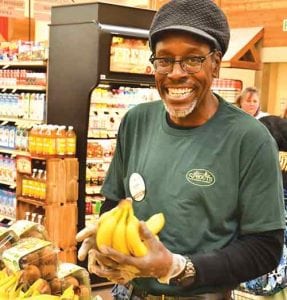 At the Charlotte grand opening, team members in front of customers were briskly filling clear Sprouts-branded bags with fresh green beans to stock colorful displays. “Bagging produce like this in the produce department creates excitement,” says Pang. However, pre-packaged Sprouts Brand products, such as bagged salads, grape tomatoes and pre-cut organic butternut squash, pervade across the department, in addition to freshly juiced and bottled health drinks and other in-store prepared fresh-cut options lining shelves. Whether an item comes with a Sprouts Brand label or not, the Sprouts banner is becoming synonymous with health and wellness characteristics, according to Sanders.
At the Charlotte grand opening, team members in front of customers were briskly filling clear Sprouts-branded bags with fresh green beans to stock colorful displays. “Bagging produce like this in the produce department creates excitement,” says Pang. However, pre-packaged Sprouts Brand products, such as bagged salads, grape tomatoes and pre-cut organic butternut squash, pervade across the department, in addition to freshly juiced and bottled health drinks and other in-store prepared fresh-cut options lining shelves. Whether an item comes with a Sprouts Brand label or not, the Sprouts banner is becoming synonymous with health and wellness characteristics, according to Sanders.
Even the “flipped” peripheral areas continue counter-traditional supermarket themes and speak to the Sprouts healthy lifestyle reputation, whether it’s the section devoted to vitamin and nutritional supplements (team members are equipped to help customers understand which drugs they’re taking may counteract or impact the efficacy of certain vitamins), or the mindfully selected natural and organic dairy and frozen food products.
True to its farmers market insignia and personality, the produce department is encircled by eye-catching and prominent signage, depicting words such as organic, as well as farm fresh, all complemented by catchy slogans throughout the store, reinforcing its messaging.
AFFORDABILITY AND APPROACHABILITY
A founding tenet of the chain’s mission also flips another retail enigma; the stigma that eating well comes with a high price tag and highbrow mentality. Seeing a gap in the market, Sprouts set out to make healthy, quality food affordable and approachable to the mainstream, and within reach for the everyday consumer. According to Sanders produce prices at Sprouts are on average 20-25 percent below supermarket prices.
“We want to be inclusive, not exclusive,” says Sanders, wherever one may be in the spectrum, from delighting a diehard organic vegan to providing non-judgmental guidance to a less-seasoned, more flexible inductee testing the waters of healthier food alternatives. “A lot of folks are misguided they can’t afford to eat well. Sprouts is a contradiction to that,” he says.
“Produce is our signature department, and we’re striving to bring value to our customers every day, but especially in produce because we understand how important that is to making healthy choices and beginning that journey toward eating better,” say Sanders, pointing to a popular Sprouts saying, “Every meal is a choice, and healthy living is a journey.”
Since Sprouts takes an untraditional grocery path, and many of its product offerings may be unfamiliar to people, training and education become paramount to its operations, according to Sanders, who stresses the importance of having educated team members on the sales floor to help in purchasing decisions.
In more colloquial terms, “Doing things the Sprouts way,” is a phrase echoed from numerous employees throughout the store. Last year, Sprouts devoted more than a half-million hours of formalized training for its team members. But Sprouts isn’t looking to hire specialists particularly. “Actually, what we’re looking for are great personalities. And we train on the skills,” says Sanders, adding, “We place an enormous focus on equipping our team members for success.”
“Employees may have worked in other retail stores, but because our model is so different, we really put an emphasis on new team member training, especially in new markets that might not be familiar with our stores, and also the level of engagement in the store, which is a little more in-depth than a conventional grocery store,” says Pang.
To that end, Sprouts brings in regional produce trainers, produce managers and other specialists from across the chain to guarantee new stores hit the ground running, and maintain the momentum long after. Produce suppliers also get involved.
Melissa’s World Produce, based in Vernon, CA, and a Sprouts partner, had a lively presence at the Ellicott City, MD grand opening, cooking up samples of spicy edamame and interacting with new customers. “This is a new market for Sprouts and an important store for them and we want to give them as much support as we can,” says Dale Roberts, regional sales manager for Melissa’s in San Diego.
“We’ve been partnering with Sprouts for around five years, pioneering some projects together where we’re really in lock step, not only in product and merchandising but in educating consumers,” says Matt Bergholz, Melissa’s business manager out of Phoenix, where Sprouts is headquartered. “We love to do grand openings but we have teams come to the stores all the time,” says Bergholz, adding, “Sprouts is produce-centric and unique. It’s a real community here. You find a lot of passion with the associates, from the store managers to the checkout clerks.”
GREEN LEADERS
“Each one of our stores has a green leader, a dual role the assistant store manager plays to champion sustainability initiatives,” says Romero. Specific sustainability responsibilities are embedded within the job position, including tracking and reporting progress to corporate, and advancing new procedures and processes to their teams at the store level, according to Rojas.
When building the sustainability platform the executive suite wanted to ensure sustainability initiatives pushed out to the stores would be readily adopted and progress to maximum potential, according to Rojas. This would require sustainability leaders at the store level solidly vested in their success.
At the Charlotte grand opening, Joseph Williams, a Sprouts assistant produce manager and green leader from Tampa, FL, was getting his exercise, running around the produce department, busily merchandising and training new store employees. “I take my sustainability role seriously. It’s a big responsibility,” he says. “I’ve worked at other grocers, and Sprouts is a whole different company, from the culture to the opportunities Sprouts provides for its employees,” he says. “It’s a healthy environment. Look how everyone gravitates to the produce department. The interaction between team members and guests is wonderful. That’s what makes Sprouts exciting. There are no walls,” he says, both literally and figuratively.
“The best to me is our relationship with customers,” he continues, asking a mother if she would like a banana for her child. The mother happily accepts, as Williams is summoned to help another produce employee. His parting words: “There’s nothing better than sustaining your personal well-being and the well-being of others, and the life of our planet.”
Sprouts may epitomize the expression “being in the right place at the right time” on its journey, to capitalize on heightened awareness around CSR, sustainability and healthy-eating/lifestyle trends. These touchpoints have become increasingly relevant to a much broader and diverse customer base and are influencing purchasing decisions. Retailers and suppliers jockey to preserve and attract the demanding, and often fleeting, loyalties of customers as well as employees. Sprouts spawns a culture enveloped in purpose and passion, which can appeal to both.
“Ninety percent of the store’s 17,000-plus products is organic or natural, and the other 10 percent really caters to our more conventional shopper that’s just learning to eat better,” says Romero.
“We’re constantly looking to strike the right balance between quality and value,” adds Romero. “That’s a guiding philosophy for Sprouts. We’ve always been at the intersection of quality and value.”
Using eggs as an example, Sprouts offers a conventional egg, but also a free-range antibiotic-free variety, Romero explains, educating an inquisitive customer while correcting her misconception that a brown egg is healthier than a white one. “We know we have a broad customer base. Similarly, we have organic apples and also regular varieties…”
“On any given day, we’ll have hundreds of organic fruits and vegetables available. Customers can see a tally of organic produce items on sale that day, the percentages vary, but organic produce as a makeup of total produce offerings is growing significantly each year,” says Rojas.
“Our farmers market reputation comes from our longstanding relationships with local growers and vendors, coupled with our ability to sell a high volume of fresh produce at great prices,” says Pang.
 As Sprouts moves into new states and territories, so does the chain’s commitment to extend its distribution network and to develop new local sources. “Not only do we need to operate sustainably, and profess and be active in sustainability with our customers and team members and in our community, we also need to take into account the products we sell,” says Rojas, adding, “Our products might be healthy when you consume them, but is the supply chain of our product healthy within itself.”
As Sprouts moves into new states and territories, so does the chain’s commitment to extend its distribution network and to develop new local sources. “Not only do we need to operate sustainably, and profess and be active in sustainability with our customers and team members and in our community, we also need to take into account the products we sell,” says Rojas, adding, “Our products might be healthy when you consume them, but is the supply chain of our product healthy within itself.”
Sprouts has taken a variety of steps, including third party supplier audits, to hone its supplier base to those meeting certain sustainability and ethics standards and practices, looking to bring in new suppliers, while weeding out offenders. “Produce was one of our first initiatives,” says Rojas, reaching out to and working with suppliers on their sustainability measures, including use of pesticides and herbicides, and fair treatment of workers. Rojas says it is critical decisions are fact and science based, as opposed to opinion and hearsay. In that respect, Sprouts sees a place for both organic and conventional produce responsibly grown.
SPROUTING COAST TO COAST
Emboldened by a produce-centric, intricately synchronized sustainability mission, Sprouts, a relatively new player in the retail scene, is well-positioned to increase market share.
With the first Sprouts store only opened in 2002 in Arizona, the chain is one of the fastest growing in the country, according to Sanders.
Driving its expansion coast to coast, Sprouts will operate in 19 states by the end of 2018, targeting 30 new stores this year, Pang said, including entry into Pennsylvania and Washington, as well as expansion in Florida, Maryland and North Carolina. The local media exposure and internal excitement that bubbles around the grand openings is part of the Sprouts story, drawing crowds and stirring up the competition.
From a corporate vantage point, Sprouts’ relatively small footprint makes it easier to slot into new locations. Its size and ethical business practices make municipal decisions by local governments a little easier than those faced by much larger retail entities. “Our eastern expansion is supported by a new distribution center in East Point, GA, that enables us to continue to grow up the coast,” says Romero. [Sprouts also has DC’s in Glendale, AZ; Wilmer, TX; in Colton, CA, and Union City, CA.]
“I’m proud we are a high growth company,” says Sanders. That growth extends to many aspects of the business. “Progression at our company can be realized in short order,” he says, adding that last year Sprouts promoted 23 percent of its employees. “So, if you think of a person who is hitching his or her wagon to a brand in retail, this is a company that has a lot of runway in front of it. This company also provides an opportunity for people to realize their potential both professionally and personally, in terms of their responsibilities. And that’s not always the case.”
FOOD RESCUE/HUNGER RELIEF. COMMUNITY OUTREACH
Fighting hunger in its communities propels Sprouts Food Rescue Program, and donating fresh produce is a cornerstone, according to Carlos Rojas, vice president for legal, risk and sustainability at Sprouts Farmers Market in Phoenix, AZ.
In 2017, Sprouts recovered more than 155 million pounds of food and other recyclables from its waste stream, resulting in an overall diversion rate of 55 percent. At the pinnacle of that food recovery hierarchy, Sprouts donated 23 million pounds of food last year, working in partnership with some 350 hunger relief agencies, he explains.
Developing the Food Rescue Program involved an incredible effort, Rojas says, from getting executives comfortable with the liabilities of donating perishable foods, to setting up guidelines and standard operating procedures for the stores and the entire structure around that.
After a successful pilot in 2013 with St. Mary’s Food Bank Alliance, based in Phoenix, AZ, “the response from our team members was overwhelming; they welcomed the idea that they no longer had to deal with one-off programs for food donations, and having a structure in place to make a positive impact on the community. Our store managers, regional directors, vice presidents, our executive team, everyone from top down, were ready to get on board, and we said, ‘full steam ahead, let’s start rolling out the program across the chain.’ ”
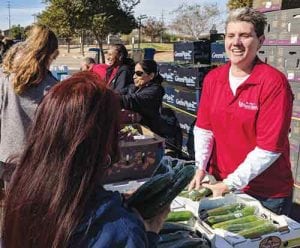 “When Sprouts came aboard and started their Food Rescue Program, it was a match made in heaven for St. Mary’s Food Bank, because fresh fruits and vegetables were exactly the types of foods we were looking for,” says Jerry Brown, director of public relations. “There’s no way we could have a better partner. Sprouts has really done everything in their power to rescue as much food as possible since the partnership began.”
“When Sprouts came aboard and started their Food Rescue Program, it was a match made in heaven for St. Mary’s Food Bank, because fresh fruits and vegetables were exactly the types of foods we were looking for,” says Jerry Brown, director of public relations. “There’s no way we could have a better partner. Sprouts has really done everything in their power to rescue as much food as possible since the partnership began.”
“St. Mary’s Food Bank distributed 86 million pounds of food to our clients last year, and 30 million to 35 million pounds of that was fresh fruits and vegetables, some coming directly from the ground from the border of Nogales and Yuma, but a lot from food rescue, with Sprouts as a leader in that effort.”
Handling perishables items comes with added challenges.
“The time clock is escalated with fresh fruits and vegetables, and product for food rescue is already at the tail end of its lifecycle,” says Brown, emphasizing the importance of maintaining the cold chain from the retailers’ refrigerated space to the refrigerated truck to the food bank cooler. St. Mary’s is in the middle of a $4.5 million project to expand its refrigerated space to accommodate. “We send out 40 food trucks every day to pick up at food sites,” adds Brown, noting it collects from 21 Sprouts stores. “This year, we’re on track to rescue 2.5 million pounds of fruits and vegetables from Sprouts, and the number continues to grow each year.”
Fresh produce donations are important.
“Not only do we want to feed people, we want to provide healthy foods, and get fresh fruits and vegetables on the tables of those in need,” says Brown. In addition, “Stores are doing so much better in reducing shrink, and not over-ordering, so there is less food waste, and discount outlets or dollar stores are willing to purchase that food that used to be diverted to food banks, so we are getting less and less donated canned and dry foods,” he says. “St. Mary’s also receives hundreds of thousands of pounds of food from Sprouts during its annual Grab and Give Holiday Food Drive, where customers purchase pre-made bags filled with the food bank’s most needed non-perishable items,” he says.
 Community outreach envelopes Sprouts’ sustainability platform and is fostered through the Sprouts Healthy Communities Foundation, founded in 2015, with a goal to empower people to live healthier lives by providing health education and access to nutrition and healthy food, according to Kalia Pang, senior public relations specialist. At the top of the Foundation’s existing $500,000 commitment, Sprouts partners with REAL School Gardens to develop school nutrition curriculums and build multiple school learning gardens.
Community outreach envelopes Sprouts’ sustainability platform and is fostered through the Sprouts Healthy Communities Foundation, founded in 2015, with a goal to empower people to live healthier lives by providing health education and access to nutrition and healthy food, according to Kalia Pang, senior public relations specialist. At the top of the Foundation’s existing $500,000 commitment, Sprouts partners with REAL School Gardens to develop school nutrition curriculums and build multiple school learning gardens.
As Sprouts enters new markets, it kicks off new learning gardens, with “Big Digs.” In addition to monetary contributions, REAL School Gardens and Sprouts volunteers join with teachers, students and community members to transform empty schoolyards into interactive learning spaces, where children learn about the food cycle and sustainability by growing produce, herbs and flowerbeds to benefit the school cafeteria and student’s families.
WAKING UP WITH A HIGHER PURPOSE
Q&A with DAN SANDERS Chief Operations Officer Sprouts Farmers Market
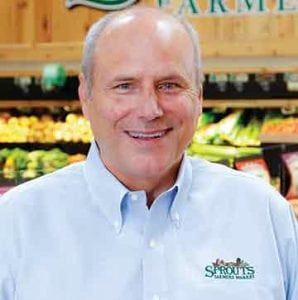 PB: Could you give us some broad-strokes concepts about how sustainability fits within the overall Sprouts philosophy?
PB: Could you give us some broad-strokes concepts about how sustainability fits within the overall Sprouts philosophy?
Dan: As you can see from your tour of the store, produce is our signature department, and we’re striving every day to bring value to our customers, especially in produce because we understand how important that is to making healthy choices and beginning that journey toward eating better.
First and foremost, we think of ourselves as a people-first organization, and so in our company we’re committed to putting people on the sales floor who are knowledgeable and can speak to the attributes of our products.
PB: Are you looking for produce specialists?
Dan: Actually, what we’re looking for are great personalities. And we train on the skills. For example, last year we had more than a half-million hours of formalized training. We place an enormous focus on equipping our team members for success. What we find is in our store, which generally carries about 17,000 unique items, a lot of our guests aren’t as familiar with what we carry as in conventional stores.
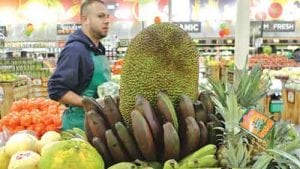 PB: You’re bringing in items that might not be as available in a conventional supermarket?
PB: You’re bringing in items that might not be as available in a conventional supermarket?
Dan: Yes, that’s correct, and as a result, we feel it is important to put team members on the sales floor who can speak to that.
What we’re most proud of is we believe every meal is a choice, and each day when we open these stores, people who walk in are on some stage of that journey. Some people are eating clean; some others might be taking their first step, and so instead of eating a deep-fried chip, maybe they choose a kale chip.
We’re not trying to legislate what people eat, but we are trying to provide choices, and education around what might be a healthier choice.
In terms of our commitment to sustainability, obviously a brand focused on healthy choices and being a good partner in the community is also going to be committed to sourcing in line with our passion. So, sourcing is one of our pillars, and it is a very important area of our sustainability.
We have four pillars to our sustainability vision. We’ll start with the communities, because we want to help build connected communities that are improving the quality of life for everyone.
The second area is our commitment to providing fulfilling work for our team members so they can realize their potential, and that is important to us because we are a people-first organization.
We also, of course, are committed to sourcing as I mentioned. We hold high standards in terms of the ethical treatment of animals — as well as people — when it comes to our supply partners. We believe that is a critical component as well.
PB: Is there an order in terms of prioritizing the pillars, one over the other?
Dan: I wanted to wait to talk on the environment because this is what you might be most interested in, and that is our commitment to zero food waste by 2020. We’re making significant strides to achieve that goal and to provide whatever food we can to local foodbanks and to those who are in need.
With so much fresh product in our stores, we have solid partnerships in all of our trade areas to make certain we are making the best use of product that is still very good but might have a blemish. So rather than just discard, we want to make certain we get it to those in need.
We are making aggressive steps to be a responsible retailer when it comes to energy conservation and carbon footprint, things that all companies leaning forward in sustainability are concerned with. So those four pillars — environment, sourcing, team members and community — are very important to us and we’re working every day to make progress.
PB: Following up, from a sourcing standpoint, do you have certain requirements or sustainability standards you’re requiring of suppliers.
Dan: We do. What we’re trying to do is to be a good partner to the supply chain. So, we’re working together with them to move the ball down the field in this area. And because we have so many partners that might be smaller in terms of size and not as large as some of the names that you might be familiar with, in many cases our partnership is about educating them and helping them achieve the sorts of standards we are seeking to achieve over the long term.
PB: People might be at different levels.
Dan: Exactly. We are transparent about our standards and what we’re trying to do, but we’re also trying to be good partners and shoring them up along the way so that these companies can make progress within their own organizations.
As we continue to grow, we have some purchasing preferences for companies that employ sustainable sourcing, and more and more of the supply community is asking how can they serve Sprouts. One way to get on our radar is to be committed to these higher purpose concerns.
PB: With your personal background and experience in conventional grocery, could you talk about how that compares to Sprouts?
Dan: I have spent many years in the industry; in fact, I was president of Acme Markets for a period of time. I think there are two major differences between what we’re doing and what a conventional supermarket might be doing. First, we’re very much committed to a passion that says we have a higher purpose in this business, and our higher purpose is noble in as much as we’re getting up every day to inspire people and serve and enrich the lives of people who shop our stores.
We do that through education and through helping them make choices, so they can live a longer and healthier life. I think by having a noble, higher purpose, changes the entire approach to our work, as compared to a conventional supermarket, which might be more concerned about other matters. That’s Number One and an inspiration for all of us.
The second thing that differentiates us is the size of our store, which is about 28,000 square feet, so we try to make it super easy to shop. It’s easy to get in and out. So many conventional supermarkets over the years have just gotten bigger and bigger. In our case, we like smaller and more experimental.
So for any guests who are coming over to Sprouts to check us out, what they’ll find when they walk in the store is the site lines are very different. When you walk through our doors, you see the entire store.
PB: And the produce department takes over that visual.
Dan: That’s correct. And then the fact we’re 28,000 square feet allows people to get their shopping done in a relatively short time and get back on the road.
PB: We have observed that your open-style layout seems to gravitate employees into the center of the store to interact with customers rather than sending them to aisle 5…
Dan: That’s the third real differentiator. You’ll find team members on the sales floor engaging with customers, providing knowledge, helping them to make decisions perhaps regarding a healthier choice. We’re trying to meet people wherever they are.
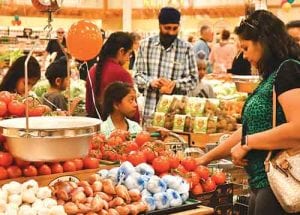 PB: Could you give a little more understanding of the emphasis and breakdown of natural, organic and local?
PB: Could you give a little more understanding of the emphasis and breakdown of natural, organic and local?
Dan: The irony is the definition of local varies depending on who you’re talking to. Our primary interest here is to make certain what we’re putting in our store measures up in terms of flavor, nutritional value, and quality. And that’s our first focus. Secondarily, when we’re in a local area, going back to our four pillars, we want to support the community. To the extent there are community favorites — items that are produced in the community that our guests want to see in our stores — we take an aggressive look to see what we can bring in to satisfy the needs of the local community.
We apply the same kinds of standards to all of our partners, because we want to ensure we are a good guardian of nutrition for our customers.
I will say that we’re exercising a fair amount of scrutiny on all the items we bring to the store, because we want to be known as a reliable source for product, and as a result, we want to be able to understand how these products were prepared, how they were grown and so forth. We apply the same kinds of standards to all of our partners, because we want to ensure we are a good guardian of nutrition for our customers.
PB: Sprouts as a brand signifies certain characteristics…
Dan: I’m not suggesting that individual brands don’t have their own stories, as many of them do and they are wonderful stories. What I think is different is that the Sprouts brand is becoming synonymous with this idea of guardianship of what’s good and nutritional. And we’re protective of that.
Now, I should say one other thing… that it’s not 100 percent of what you find in our stores is suited for someone who’s eating completely clean. You’ll find some things in our stores that are common items that people have in their pantries or refrigerators. The idea here is that the quality of what we put in the store is high level, and again, we’re not trying to legislate what people eat but to meet people wherever they are.
PB: What are your thoughts on Whole Foods Market and how Sprouts compares?
Dan: Each retailer makes its own choices of what it wants to bring to the community. I would say at Sprouts, first and foremost, we want to be inclusive, not exclusive. When we open our doors, we’re here for everyone, and we understand that value is an important equation for consumers today. So, for example, in our signature department of produce we strive to bring a compelling offer to the customer every single day. We realize people work hard for their money, and we’re here to bring a good balance in terms of offer and value.
PB: Some people view buying fresh produce and eating healthy as more expensive and out of their league. And you’re trying to change that perception…
Dan: When you get back to our passion statement, it’s really about making healthy eating affordable. I agree with you in that respect that there are a lot of folks who are misguided that they can’t afford to eat well. Sprouts is a contradiction to that.
PB: This has been an inspiring interview, especially how you talk about waking up each day for work with a higher purpose
Dan: The thing I’m most pleased with in this particular company, apart from the passion statement and the fact that people do get up inspired to come to work because they know they are helping people: I’m proud we are a high growth company. Progression at our company can be realized in short order. If someone comes to work for Sprouts and has a good attitude and has the ability to retain knowledge, that person can move quickly into positions of greater responsibility.
Last year we promoted 23 percent of our people internally. So, if you think of a person who is hitching his or her wagon to a brand to be in retail, this is a company that has a lot of runway in front of it.
GOING ALL IN
Q&A with CARLOS ROJAS Vice President – Legal, Risk and Sustainability Sprouts Farmers Market, Phoenix, AZ
 strong>PB: We are proud to honor Sprouts with this year’s Retail Sustainability Award. Three things resonated and I wanted your comments.
strong>PB: We are proud to honor Sprouts with this year’s Retail Sustainability Award. Three things resonated and I wanted your comments.
FIRST: With his conventional grocery chain background, Chief Operating Officer Dan Sanders (formerly president of Acme Market) was able to articulate what made Sprouts unique. He described waking up each day with a higher purpose: To service and enrich people through education and choices so they can live longer and healthier lives.
SECOND: The significance of Sprouts as a brand synonymous with certain characteristics — nutritious, quality products at affordable prices, ethical sourcing, environmentally conscious, etc. With the brand, there’s an association where health care professionals, for example, actually refer people to Sprouts because you’ll be helping them take steps toward a healthier, happier life.
THIRD: Sprouts seems to tie these ideas together, with the overall importance of fresh and produce-centric positioning within the sustainability mission.
Carlos: That’s great and refreshing to hear. I also hear that from a lot of people… our guests who shop here, stakeholders, and government agencies — the EPA, for example, has really sung the praises of our brand, and we’re humbled.
A lot of people, and a lot of retailers especially see sustainability as a marketing opportunity. We want to make sure our customers and stakeholders — investors, vendors, suppliers, team members, customers, NGOs, government agencies — have a say in how we approach sustainability. Not just because it’s good for marketing, but it’s simply the right thing to do. It’s also good for business, it’s good for people, and it’s good for the environment.
It’s built into our DNA of how we approach sustainability and the way we do business. We can’t profess a healthy lifestyle and not live it ourselves. It’s part of our core philosophy. Dan Sanders is a very passionate and knowledgeable spokesperson about sustainability.
PB: Could you tell us more about your role and provide some context of how sustainability fits within Sprouts’ core philosophy and its overall mission?
Carlos: Sustainability resonates throughout our company, and it really boosts morale. All our team members feel it and understand we care. Our customers understand we care, and this helps build more affinity to the brand and better loyalty to the brand. We see sustainability as part of our business, not a gimmick or a marketing ploy, but the way we do business. That has helped us to really advance and move these initiatives forward.
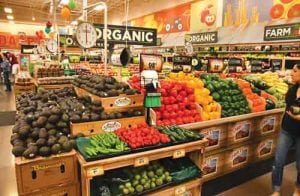 PB: Was there a time when Sprouts created a formal sustainability plan or platform?
PB: Was there a time when Sprouts created a formal sustainability plan or platform?
Carlos: Let me give you some background as to the company itself. Our first Sprouts Farmers Market was founded in 2002 in Chandler, AZ, by the Boney family, and Shon Boney, specifically. This is an individual who comes from a long line of grocers in his family. His grandfather Henry opened stores in California, named Boney’s Marketplace, which became Henry’s Marketplace, and they eventually sold that.
Then Shon came to Arizona and opened the first Sprouts store and started growing the brand with this philosophy of healthy living. Our first slogan, I remember, was “Healthy Living for Less.” The intent was how could we provide healthy alternatives to customers where they don’t have to pay the prices of the premium natural organic grocers, which was mainly Whole Foods at the time. That was the tenet or the premise of the business model.
PB: Has that business model remained constant?
Carlos: Fast forward from 2002 to 2011, where a group out of New York sees the potential in the Sprouts brand, acquires and starts merging us with other companies, similar to the philosophy Sprouts had, really understanding the Sprouts concept was something special, and therefore, Sprouts was always the brand that survived through those consolidations.
We grew to about 130 stores by 2012, and that’s when I came along. We’ve merged three companies into one banner, and we’re trying to integrate three different companies with three different cultures into one. We did it in a way to ensure the Sprouts brand survived and our identity was formed and eventually became who we are today.
PB: Did that also involve you merging your legal background with sustainability initiatives?
Carlos: I’m a corporate attorney, and have practiced law my entire career. Before Sprouts, I was in big private law firms, but sustainability was always a passion of mine, and to live sustainably to the best of my ability with the knowledge I had at the time. I had the incredible luck of having parents also passionate about sustainability, and not just the environmental side but also the social governance side.
So, when I joined Sprouts as corporate council, I started having conversations with senior officers here at the company, including our current president and chief operating officer Jim Nielsen, and we started talking about how we would build the brand and further develop the Sprouts identity.
One thing that popped in our heads… what do we do with all this food once it’s no longer in saleable retail condition? We throw it in the trash for the most part. Some stores have ad hoc programs here and there where they donate to local food banks but it’s not organized, it’s not structured. So, Jim, Brandon Lombardi, our chief legal officer and chief human resources officer (who’s also very passionate about sustainability) and I put our minds together and started developing a program to donate food. In 2013, less than a year from when I joined Sprouts in October 2012, we started the Sprouts Food Rescue Program.
PB: What challenges did you face?
Carlos: It was an incredible effort because it required legal analysis to get the company comfortable with donating food without having a high risk of liability because, of course, it was a question in some of our senior officers’ minds, what if we donate food and get somebody sick. That’s a great point, so we did some legal analysis. You’re probably familiar with the Good Samaritan Act, signed into law during Bill Clinton’s presidency.
This law protects retailers and food establishments from donations that may cause some type of injury, as long as those food establishments are taking precautions to make sure they are not knowingly putting out food that could make people sick. So of course, that was never going to be the case. How do we get everybody comfortable, especially people who have never undergone a program like this at the executive level?
We looked into this and developed guidelines throughout the process from collection at the store level when the food was no longer at retail condition but still perfectly edible, to storage depending on the category of the product, into coolers, or boxes, for instance, taking into account our small footprint. And then we need to be coordinating with the foodbanks to assure they are picking up the products before they spoil.
So we developed a network of foodbanks. At the time it was just a pilot in Arizona with three food banks, mainly one, St. Mary’s Food Bank Alliance. We established guidelines and standard operating procedures for the stores to follow and established an entire structure around that.
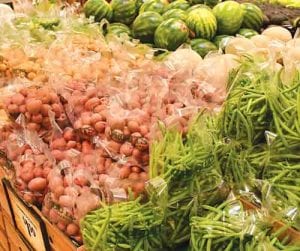 PB: Did everything go as planned?
PB: Did everything go as planned?
Carlos: We developed the Food Rescue Program in 2013 and the response was overwhelming, and by that I mean the response of our team members; they were hungry for this; they welcomed the idea that they no longer had to deal with these one-off programs.
It was like a light switch went off in our stores. Our store managers, regional directors, vice presidents, our executive team, everyone from top down saw it and we said OK full steam ahead.
PB: Can you point to the program’s effectiveness?
Carlos: Fast forward to 2017… last year we donated 23 million pounds of food, an equivalent of 19 million meals to our communities, directly in the local communities where we operate. We work with more than 350 hunger relief agencies, more than 80 percent of those affiliated to Feeding America, so we have a very strong relationship and partnership with Feeding America.
PB: What other steps do you take to divert food waste?
Carlos: As we developed this Food Rescue Program, we asked, what do we do now with the food we collect that is not edible or safe for human consumption? We started working with the EPA at that point, following the EPA’s food recovery hierarchy. What other outlet can we divert this food to that would also contribute to reducing food waste?
Diverting food waste to animal feed programs was the next obvious choice. We started to establish networks with different cattle ranches in areas where we operated, providing food not fit for human consumption to animal feed programs.
Last year, we donated 25 million pounds of food to animal feed. This is helpful as well because it reduces the amount of new crops needed for this feed. We work with more than 36 farms in the United States, in some cases feed going to cattle ranches or dairy farms that produce milk, make it into our stores for us to sell, so we are closing the loop, completely going full circle.
After that, there are certain areas where there may not be any farms around, so the next level in the food recovery pyramid is compost. We started working with compost facilities, and last year we donated five million pounds of food for compost, which would be enough rich compost for covering 100 acres of cropland, or the equivalent of seven football fields.
PB: Could you elaborate on how these sustainability measures are integrated throughout the different stores?
Carlos: Let me explain how it works. A few years ago, we went down the path of how do we make sure these sustainability measures we’re pushing out to the stores are being carried out in the stores? We can designate a person to be a champion of these ideas, to be the green leader, and who should this person be. It could be a courtesy clerk or a department manager.
So, we have our assistant store manager designated as the green leader. We actually embedded this in their job description, so when they’re hired, there are functions and duties they must carry out, and they need to support and advance the sustainability initiatives of each store. So, they’re responsible for tracking these initiatives and reporting on these initiatives here at headquarters. They are responsible for disseminating any new procedures or processes to their teams at the store level.
Rather than a couple stores doing it as a hobby or there’s a few people passionate about it, this is a way to benchmark coast to coast, you can see top performers, and then the green leaders talk to each other on what’s working and how to get their program working better.
We really believe if you empower leaders on sustainability, they will in turn empower their team members at the store and make sure these initiatives are being followed and carried out.
PB: Could you elaborate on how this affects product sourcing and suppliers?
Carlos: Our products might be healthy when you consume them, but is the supply chain of our product healthy within itself? We started doing audits of our suppliers, focusing first on our main suppliers, encouraging sustainability practices.
PB: Could you speak directly about produce suppliers?
Carlos: Produce was one of our first initiatives, which is huge. Produce is representing 25 percent of our sales, and is a main part of our store. We started a program where we reached out to all our produce suppliers and provided information on our sourcing standards, requested certifications and third-party audits on their sustainability practices on their use of pesticides and herbicides, and fair treatment of people, Fair Trade, for example, in developing countries, child labor and slave labor, having them provide certifications and independent verification of these things.
Now we have general sustainability standards our suppliers adhere to, but we’re still going down the path of developing processes for verification companies are meeting to adhere to those standards. We have more than 17,000 products we carry, so our approach has been to focus on the products that have the most impact and from there working down the supply chain.
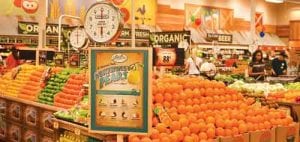 PB: I wanted to follow up with you on issues of produce-related sustainability requirements. You mention herbicide and pesticide levels, for instance. The produce industry is concerned that misconceptions are spread by the media. One example is the Environmental Working Group’s annual Dirty Dozen list. What are your views?
PB: I wanted to follow up with you on issues of produce-related sustainability requirements. You mention herbicide and pesticide levels, for instance. The produce industry is concerned that misconceptions are spread by the media. One example is the Environmental Working Group’s annual Dirty Dozen list. What are your views?
Carlos: We live in the age of information, yet this is the age where misinformation is most rampant throughout our civilization. One group says something, another group says something else, yet there’s all this data out there and weeding through data is crucial. We need to base our decisions on actual data and science and peer-reviewed info respected in scientific journals. What are the risks and theories, like the whole non-GMO craze we went through and still riding through?
PB: It’s interesting because you have a legal background and a wealth of experience delving into the facts, so this must be very useful in assessments related to sustainability initiatives…
Carlos: My profession requires me to look into facts and not just opinions and hearsay, but info vetted by experts in their areas and peer reviewed by experts and published by respected journals around these topics.
Based on that, our approach to produce sustainability measures follows. For instance, we understand the GMO and non-GMO movement; there is no scientific data that shows GMOs are harmful to ones’ health, but there’s an asterisk —while the product might not be harmful, that organism could be harmful to its own environment. Genetically modified to that pesticide, an apple or tomato will continue to grow, but everything around it could be toxic.
So, our focus has been we don’t believe one size fits all. Conventional produce is still out there being done in a responsible way, and we want to work with conventional growers, but we are also advocates of organic growers. We believe organic production is healthier to the environment.
PB: How does locally grown product fit within your strategy?
Carlos: As we expected, new markets involve developing local growers from that region. But it’s difficult if we’re opening a store in Philadelphia, for example, where there is not a lot of local produce grown in that area. We work with other local suppliers.
In areas where we can — like in California, Texas, Colorado, and Arizona — our produce merchandising team is best in class, I know I sound biased, but everybody is in awe how they handle merchandising for produce. They go out there and establish relationships with growers. We work with hundreds of local growers and suppliers to ensure we capture the best produce, the best pricing and incredible sourcing.
Q: What are the biggest challenges and opportunities going forward?
A: Climate change is a major issue and there shouldn’t be controversy around that. We do an incredible amount of work to offset the problem with our Food Rescue Program, diverting millions of pounds of food waste from landfills. The fact we’re diverting food waste and feeding people or animals or composting makes a difference. This amounts to 75,000 metric tons of CO2 equivalent, or 16,000 cars running a full year on the road. How do we continue that? We’ve done carbon inventory assessment throughout the supply chain. Transportation is the obvious one, and we work with EPA gold standard transportation companies. There are many other initiatives underway as we continue our internal plight to address the overarching issue of climate change.
9 of 18 article in Produce Business May 2018

